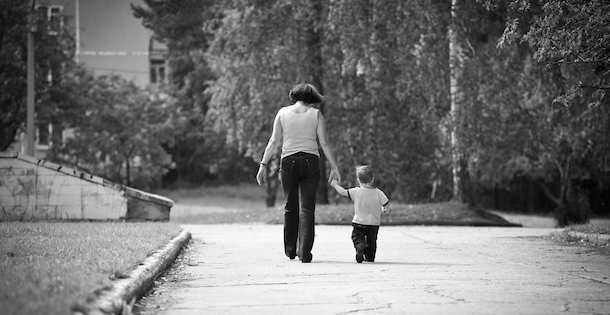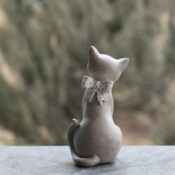Truth be told, Miriam was terrified of her grandson. When she looked at Mikie, she saw a shrunken version of her son. A brown cowlick sat straight up on his head like a pickaxe. The look of a serial killer flashed over his eyes when he was crossed. For Miriam, the pictures in her photo albums never aged. Life repeated itself in a continuous loop.
“It’ll only be for a weekend,” said Wendell. He didn’t have the nerve to lower the boom in person. Instead he phoned his mother at home.
“That’s, fine, Wendell, click, that’s fine.” It was 6 o’clock, dinnertime, the time of day when every taped political message, consumer survey and solicitor robo-called Miriam’s number. Miriam wistfully remembered when telephones were simple, when all your finger had to do was find the right hole and turn the dial. Now every conversation was punctuated by clicks.
“We’ll leave Miami Friday afternoon and be back Sunday click. Jolene’s making you a list. New York’s click just a phone call away. Heather and Glen click are down the street you remember Heather and Glen …”
Wendell and Jolene rarely left the boy. First her daughter-in-law nursed for two years. Then they spent the next two years trying to get Mikie to sleep in his own bed. The child was reading menus at restaurants but couldn’t cast his own shadow.
“We’ll be fine, Wendell. I can take click of a 4-year-old. We’ll be fine.”
“You’ve got to use call waiting, Mother! For the love of God use call waiting!”
Miriam pictured her son’s face reddening, exasperation working its way up from his starched shirt collar to his arched eyebrows. “You press FLASH,” boomed Wendell. “It’s that simple. You just click press FLASH.”
Miriam closed her eyes and kneaded the lids with her thumbs. “Add that to the list, Wendell. Add that to the list.”
The list was 10 pages by the time the weekend rolled around. Miriam arrived at Wendell’s home with an overnight suitcase in one hand and a sack filled with puzzles and toys in the other. Even though Miriam visited her son’s home each week, this was the first time she was asked to babysit overnight. Miriam wanted to meet the challenge head-on.
As usual, she had sought advice from her best friend. They ate at their usual lunch place at the usual time. The two elderly women sat face to face in a booth, bookended on each side by piles of sweaters, shopping bags, totes within totes.
“The child doesn’t like me,” said Miriam.
Sylvia was a breast cancer survivor. Her diet consisted of macrobiotic foods and the occasional pastrami sandwich. She Facebooked all of her grandchildren and prided herself on her computer savvy.
“Of course he likes you. It’s just that you’re a 33 and he’s a 45. Get with the program, Miriam.”
The past opened like a door. As if it were yesterday, Miriam pictured Wendell watching the black vinyl disc spin on the turntable, stepping first on one foot then the other, doing his own little dance. He especially loved those chipmunks, the ones with the high screechy voices.
“It’s all about Angry Birds,” said Sylvia, “and Power Rangers and Mutant Ninja Turtles. You can kiss Roy Rogers goodbye.”
Miriam blinked. There for an instant, for a fleeting moment, was Wendell’s arm sweeping the floor of his cowboys and Indians, his beloved fiefdom of plastic men.
“If it doesn’t have a battery,” said Sylvia, “if it doesn’t light up and make noise and give you a headache, don’t even bother.”
If Miriam expected to be greeted like Santa Claus, her fantasies were dispelled the moment she entered Wendell’s house. Her grandson thrust his head, neck, and elbows into the large plastic bag, rummaged around, and came up for air five seconds later.
“I don’t like dees toys,” said Mikie.
Miriam smiled. Then she craned her neck to the left and the right, listening. Wendell’s car had peeled out of the driveway. The coast was clear. Slowly she reached into her purse and retrieved the toy pistol.
“This was your grandfather’s,” said Miriam. “You feed the red paper in here and then you pull back the trigger …”
Mikie inched closer. He nestled Miriam like a cat, leaning into her body, clutching her blouse with his dimpled hands. “Can I touch it?” he whispered.
“Outside, on the sidewalk. This is an outside toy.”
They practiced for a full hour, aiming at the concrete. The air smelled like burnt toast. Wisps of smoke curled over their heads. Mikie jumped each time the gun snapped then just as quickly moved in for another try. Soon a parade of toys joined them. Star Wars stormtroopers, Buzz Lightyear, Wreck-it Ralph. With two hands clutching the gun, Mikie pointed the barrel and shot every toy figure dead.
Miriam looked to the left and to the right but not a single neighbor was in sight. She remembered streets filled with children, the ice cream truck drawing them like flies, mothers sitting on lawn chairs, fathers pulling up in driveways dressed in suits and ties. Like all of her memories, they were in black and white. Just like the television shows. Sometimes she couldn’t tell if the movies in her head were celluloid or real, the past blurred, the memories seeping like a sieve.
“It’s time to put the gun away,” said Miriam. She took Mikie’s hand and guided him inside the house. “We put it back in Grandma’s purse, and tomorrow we take it out again.”
He opened and closed his mouth like a small fish gasping for air. “But, I like it, Grandma. I really like it.” Again he leaned against her, his cheek rubbing against her leg.
“This is our little secret, sweetheart. The gun stays with me. When you come to my house, you can play with it there.”
She found Mikie’s favorite television channel and gave him a bowl of grapes to munch on. Then she grabbed both of his elbows and steered him towards the couch. “I’ll be right back,” she told him. “I have to warm up dinner.”
For three, maybe four minutes, her back was turned. The child was probably 15 feet away. If she pivoted counterclockwise at the sink, gazing over the counter and past the dinette set, she had an unobstructed view. Miriam put the frozen fish sticks in the microwave and pushed the buttons. For three, maybe four minutes, her back was turned. But when she glanced his way, the couch was empty.
The TV sang. Sunny days sweeping the clouds away.
“Mikie, sweetheart, dinner’s almost ready!”
On my way to where the air is sweet …
“Mikie! Mikie!” she yelled. “It’s time to wash up for supper.”
She sprinted into the den and ran her hand over the couch, as if the touching could magically summon her grandson’s bottom. It was still warm. In the middle of the cushion was a pancake-size depression, the soft weight of a child’s body pressing down.
She looked first in the downstairs bathroom, then in the living room. Next she opened the closet doors.
“Mikie!” her voice was louder now, a mix of irritation and fear. Fumbling at the locks, once twice three times pulling at the pegs, Miriam opened the sliding doors onto the patio. An uncle, it was Mortie or Bertie or Herbie, who could remember the name, had drowned at Coney Island. Her parents feared the water, were terrorized by the ocean, tucked her into bed with nightmare stories of people found beached on the sand like dead whales. The childproof fence was still intact. The water of the swimming pool clear.
She ran upstairs next, opening each door, checking under beds and behind curtains. Her heart pounded like a drumbeat. Mikie was nowhere to be found.
The gun! She must have been out of her mind to let him play with the gun! She flew downstairs and ran into the guest bedroom. There on the bureau was her purse. She poured the contents on the bed and shook it hard until every penny and pen rolled out. The toy pistol was gone.
She opened the front door slowly, whispering a little prayer as daylight inched in. Please God, let the child be there. Please God, let the child be on the sidewalk playing with the toy. She breathed in and out, prolonging the moment of knowing and not knowing, working up the courage to face the sun.
Her eyes swept the yard, the sidewalk, the neighbor’s yard to her left and to her right. There was no sign of her grandson.
Think, Miriam! Think! She ran inside and glanced at the list lying on the kitchen counter. There was a name. The name of a neighbor. But when she lifted the phone from its cradle, the touchpad looked foreign. It might as well have been written in Chinese with TALK and END in places where they shouldn’t have been and buttons, endless buttons that seemed totally irrelevant — why would anyone need so many buttons to make a simple call? She punched the numbers into the phone, but it wouldn’t ring. Instead she heard an electronic beeping, this house was filled with beeping, the doors beeped, computers beeped, appliances beeped, the beeping startling her and tormenting her like a finger poke in the ribs.
Miriam walked back into her bedroom, found her cell phone, and dialed 911. She could hear the blood pulsing through her ears.
“I’d like to report a missing child.”
They put her on hold. Beep. Can I help you?
“I’d like to report a missing child.” Miriam shouted into the phone as if the shouting would make them pay attention, would make them come faster, would bring the child who had disappeared back home.
How long has he been missing? someone asked.
She looked at her watch. “Maybe a half hour,” she said.
They put her on hold again.
“That doesn’t qualify as missing, you say?” Miriam paced the room, shouting. “Have you ever lost a child? Do you know what a half hour feels like when you’ve lost a child? It feels like an eternity,” said Miriam. “It feels like a lifetime.”
Suddenly the image of the Sears building in the Hollywood Mall flashed before her. More than 30 years back. She remembered when that little boy disappeared, the same age as Wendell. They had shopped in the store so many times, walking down the same aisles, the poor mother turning her back for a moment to look at a lamp. All it took was a moment.
Miriam hung up and dialed 911 again. “This is Miriam Lefkowitz and I’m having a heart attack,” she shouted. “3272 Andalusia. You better hurry.” Then she waited in front of the house.
Five minutes later a rescue truck pulled into the driveway. Miriam stood on the curb and waved her arms. Two people in uniform jumped out of the vehicle. A man and a woman.
“Is someone having a heart attack? We heard someone’s having a heart attack.”
“I was babysitting my 4-year-old grandson,” said Miriam. She pressed her palm to her chest. “It’s been 45 minutes. My hand to God if I don’t find that child I might as well be dead.”
“He probably ran to a friend’s house,” said the woman.
“I gave him a toy gun,” said Miriam. “He was playing with a gun.”
“The kind of gun that looks real?” asked the man.
Miriam squinted. Of course the gun didn’t look real. It was small and shiny and silver with a trail of red paper caps. What kind of an idiot would think that it was real? She smacked herself on the head.
The woman took to the street calling Mikie’s name as she made her way down the block. The man walked inside the house with Miriam. Hispanic. Tall. Beefy. Someone who couldn’t chase down a kidnapper but could easily tear him apart.
“Let’s look over the house one more time.”
Miriam nodded.
“If we don’t find him in five minutes, it’s time to call his parents.” The man looked over first one shoulder then the other. Then he stood up a little straighter and raised his voice. “Did you hear what I said, Miriam? IF WE DON’T FIND HIM IN FIVE MINUTES, HIS PARENTS WILL DEFINITELY FIND OUT.”
The man went to the kitchen and made a ruckus, opening and slamming the doors. Then he walked to the staircase, stomping his feet so hard the wood floors shook. “I’M WALKING UP THE STAIRS NOW, MIRIAM. I HATE WALKING UP STAIRS. WALKING UP STAIRS MAKES ME REALLY ANGRY. REALLY REALLY ANGRY.” When he got to the foot of the stairs, he stood like a statue and waited.
The sounds came from the powder room. The squeak of a cabinet hinge, the clink of metal falling onto tile. A roll of toilet paper unraveled down the hallway. Then a child’s voice.
“It’s me, Grandma!” Mikie rushed into his grandmother’s arms, buried his face into her lap, and started crying.
They ate their dinner of fish sticks cold and sipped their glasses of water. Miriam had never known such relief. She was too tired to be upset. She was too emptied to be mad.
Mikie finished his plate and licked his ice cream bowl clean. Then he sat and watched Miriam sip her tea. She took her time, swallowing hard, savoring each sip, willing her heartbeat to find a rhythm.
“Would you like to color with me?” asked Mikie.
“I’m not a very good artist,” said Miriam.
Mikie ran to get his crayons and a pad of drawing paper. He lay them on Miriam’s placemat, looked up at her and waited.
“Well, I do know one trick,” said Miriam. She took his water glass and traced the bottom.
“First you start with a circle,” said Miriam. Then she drew on whiskers, pointy ears, and a tail. “Now you have a cat.”
“More! More!” shouted Mikie.
She thought back and saw their kitchen in Brooklyn, the plastic peeling on the table, an icebox, a TV with rabbit ears. There was a child sitting at the table coloring. A little girl with skinned knees wearing an Annie Oakley hat. God, how she loved that hat.
“Now you have a dog,” said Miriam. “Now you have a rabbit.”
Mikie looked up. “Can I try?”
Together they traced the glass, her hand upon his. But this time when she pulled the glass away, the circle was broken. The crayon curved but one end didn’t meet the other. In seconds, Mikie’s face reddened and his lower lip shook.
“Let’s see what happens if we follow the line,” said Miriam. She took the crayon and continued the spiral toward its center. When she finished she added a small head with two tiny antennae. “Look what we’ve got now!”
“It’s a snail, Grandma! I made a snail!”
For the rest of the evening, until it was time for bed, they sat at the table and drew. Wendell and Jolene called. Sylvia checked in to make sure that Miriam was following the program.
“Couldn’t be better!” said Miriam. “We’re having a wonderful time.”
And when they woke up in the morning the kitchen was littered with papers. Spiral upon spiral. Coil upon coil. One unfinished circle after another. Their future lay before Miriam like a map. Clear. Unfettered and unencumbered. The Milky Way in the palm of her hand.
Become a Saturday Evening Post member and enjoy unlimited access. Subscribe now




Comments
And he looks like such a cute little tyke from the picture! This was an interesting story, Ms. Olin. I think the son had a lot of nerve springing the babysitting job on Miriam that quickly and in that manner, essentially ‘forcing’ her to do it.
He then went on a mini tirade about the call waiting. She seemed to do her best and the child seemed to like her after all playing with the pop gun. I’m of the opinion no child should be playing with even toy guns today, but she did manage to have fun with him until he disappeared.
At this point all of the dark shadows in her own mind, not too far from the surface, rushed to the forefront, traumatizing her all over again. The fire-rescue man found Mikie, but not before contributing more trauma of HIS own to the mix. A Xanax (thank you)at this point with some ice water would be wonderful!
After that, dinner went well and the coloring was a hit. She could (almost) honestly say everything went off without a hitch to Wendell and Jolene; God help her if it didn’t. The dilemma there is they may start asking her to overnight sit more often ‘since it went so well’, that she may need a list of excuses to have on hand so those two will have to have plan ‘B or C’ babysitters available. Grandma wants to have light, fun visits and then be able to get out of Dodge when the crying, whining etc. starts.